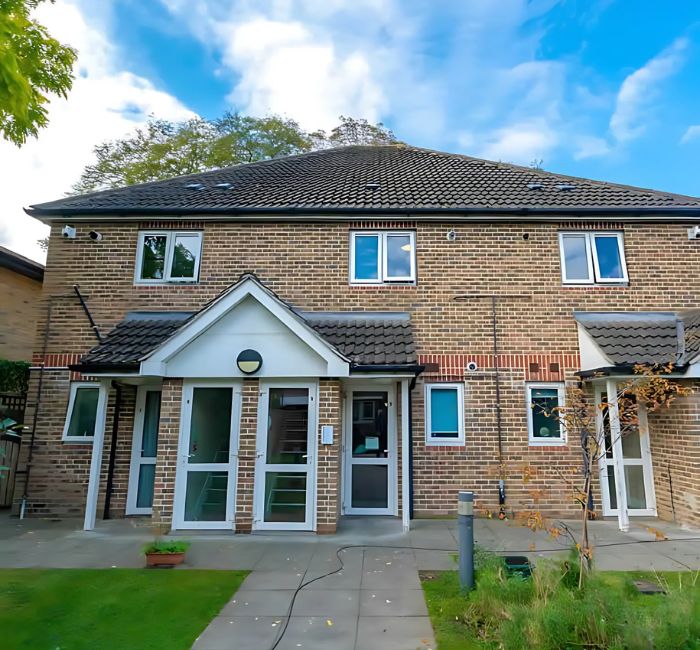Southleigh Community Hospital
Southleigh Community Hospital
Southleigh Community Hospital represents a microcosm of hope and structured support for those contending with enduring mental health difficulties or stepping down from secure or acute settings.
Our 21 single en-suite bedrooms and 6 semi-independent apartments underscore our commitment to providing environments that meet service users’ individual levels of need whilst encouraging progress towards independence. By integrating a biopsychosocial model, we honour the complex interplay between mental, physical, and social well-being.
Each service user’s journey is underpinned by personalised care plans that incorporate evidence-based psychological interventions, robust risk assessment, occupational therapy, and social inclusion measures. Our dedicated, multi-disciplinary team fosters a culture of compassion, collaboration, and positive risk-taking—granting individuals the latitude to challenge themselves whilst remaining in a supportive framework.
Above all, Southleigh is about enabling service users to envision and realise a life beyond hospital. By honing practical skills, forging community connections, and nurturing emotional resilience, we offer a bridge from the challenges of mental health crises to a future marked by personal growth, autonomy, and hope. We believe that, with the right support at the right time, every individual can reclaim their sense of agency and purpose. Through our unwavering commitment to person-centred care, we continue to transform lives, one step at a time.

Location & Surrounding
Our semi-independent apartments reflect our commitment to promoting independence. In these spaces, service users can develop and practise the skills required for more autonomous living, while still benefitting from the presence and guidance of our experienced multi-disciplinary team (MDT). Each apartment is a safe yet challenging environment that helps individuals confront obstacles and build confidence in their ability to cope beyond the hospital setting. In this manner, our entire facility serves as an adaptable stepping stone: a space where those with complex mental health needs can progress through their rehabilitation pathway in a person-centred manner.
Our overarching goal is always clear – to ensure that everyone who walks through our doors receives a level of care that meets their needs and supports their aspirations. We strive to see each service user become better equipped for life beyond hospital walls, enabling them to reintegrate into their families, local communities, and the wider society. Whether someone stays with us for a shorter or longer term, we aim to provide outstanding clinical support, therapeutic activities, and rehabilitative interventions that move them closer to genuine independence and improved mental well-being.

Our Philosophy and Guiding Principles
At Southleigh, we take pride in our overarching ethos: personalisation. We believe that every individual’s journey is distinct. Whilst two people might present with similar diagnoses, the underlying triggers, personal history, coping styles, and immediate goals often differ significantly. Therefore, our treatment programmes are shaped around individual care plans. We collaborate with each service user, their family (if they so wish), and the relevant funding authority to craft a plan that resonates with the individual’s life circumstances and long-term aspirations. This plan is then reviewed and refined in accordance with their progress, ensuring adaptability at each juncture of recovery.
Beyond personalisation, we emphasise collaboration. Our multi-disciplinary team approach unites psychiatrists, psychologists, nurses, occupational therapists, support workers, social inclusion specialists, and other allied health professionals under one roof. Collaboration goes beyond staff cooperation; it extends to the relationship we build with service users themselves. Through collaborative goal-setting and open dialogue, we aim to instil self-determination and confidence in each person.
We are also deeply committed to inclusion. Our social inclusion programme encourages service users to engage in community activities, educational programmes, volunteering, and vocational pursuits. By facilitating constructive interaction with the wider community, we help individuals rediscover a sense of purpose and belonging. This inclusive approach reduces stigma, promotes empowerment, and fosters strong social networks.
Finally, we live by the principle of continuous learning and reflection. We frequently evaluate our practices, gather feedback from service users, and incorporate the latest research in mental health care. Our commitment to professional development ensures that all staff remain abreast of emerging techniques and knowledge, equipping us to deliver the highest standard of care possible.
Facilities
At Southleigh Community Hospital, we recognise the critical role that the environment plays in promoting recovery and emotional well-being. From the outset, our spaces have been designed to promote comfort, autonomy, and a sense of community. The result is an environment that feels welcoming and supportive whilst maintaining the structure and boundaries required for a therapeutic process to flourish.
- Therapeutic Kitchen: We believe that preparing and sharing meals can be a significant aspect of personal recovery. Our therapeutic kitchen allows service users to learn or rediscover cooking skills, explore healthy eating habits, and develop self-sufficiency. Under the supervision of our occupational therapists or other members of the MDT, individuals may undertake cooking sessions, where they gain hands-on practice in budgeting, meal planning, and safe kitchen hygiene.
- Open Garden: We encourage service users to spend time outdoors, tending to plants or simply relaxing in nature. The open garden is a tranquil space where individuals can explore horticultural therapy, which has been shown to reduce stress and improve mood. Gardening fosters a sense of accomplishment and provides a calm environment for reflection. It also offers the opportunity for gentle exercise and social interaction with peers.
- Flexible Room Space with Gym & Therapy Equipment: Physical health and mental health often intertwine. Our flexible room space, fitted with gym equipment and materials for various therapeutic activities, serves as a multi-purpose area. Occupational therapists and physiotherapists can use this space to provide gentle exercise programmes that boost self-esteem, encourage healthy routines, and promote stress management. In addition, this room can host group therapy sessions, yoga, mindfulness classes, and other structured activities that enrich the recovery process.
- Semi-Independent Apartments: For those prepared to transition towards a less restrictive environment, the semi-independent apartments offer an invaluable opportunity to practise everyday living skills in a supported setting. Service users living in these apartments may manage their own schedule, prepare meals, and take on responsibilities akin to those required in the community. Throughout, they remain within reach of the broader team’s support, ensuring that risks are carefully managed and any setbacks are quickly addressed in a constructive manner.
By cultivating a sense of normality in daily routines—cooking, exercising, socialising—we facilitate smooth transitions when individuals are ready to move forward from Southleigh. The environment, in its entirety, is carefully curated to foster both clinical progress and the gradual rebuilding of self-reliance.
Our Service Users and Admission Pathways
We acknowledge that not every journey to us follows the same path. While some service users arrive from highly secure environments ready to transition into a community-based rehabilitation service, others might come laterally from other rehabilitation units or from acute wards. We also consider self-funded referrals, recognising that mental health issues do not always follow a simple, linear route. In all cases, we have a comprehensive pre-admission process designed to gauge whether Southleigh is an appropriate placement. Central to our criteria is the recognition that individuals require longer-term support before transitioning to independent living, or have had difficulty thriving in less structured environments.
A key objective of our admissions pathway is to provide clarity and reassurance. Service users often experience anxiety, uncertainty, or fear around new placements. Thus, we strive to ensure that prospective service users and their families understand our setting, our rules, and our rehabilitative approach from the start. Our admissions team liaises closely with referring bodies, performs thorough assessments, and arranges visits to the hospital so that individuals can become familiar with the surroundings, meet staff, and ask questions prior to admission.
Once admitted, service users receive an initial induction, during which we gather relevant background details, discuss immediate needs, and begin crafting a personalised care plan. This plan highlights the goals, strategies, interventions, and target outcomes agreed upon by the service user, their family (if involved), and our MDT. By maintaining transparency from day one, we foster a collaborative environment and set the stage for long-term engagement and trust.
Tailored Treatment Pathway: Psychiatric Rehabilitation
In practical terms, this means service users can expect:
1. Pharmacological Support: Our psychiatrists conduct thorough psychiatric assessments and manage medication regimes in consultation with service users. Medication reviews occur at regular intervals to ensure optimum effectiveness and to address any side effects or tolerance concerns. This clinical process is deeply collaborative, encouraging individuals to voice concerns and preferences regarding their treatment.
2. Psychological Therapies: A psychologist meets with each new arrival to begin building rapport and identifying potential psychological interventions that may be beneficial. Therapeutic modalities might range from Cognitive Behavioural Therapy (CBT) to Dialectical Behaviour Therapy (DBT) skills, from psychoeducation to stress-management and coping strategies. The chosen interventions reflect each person’s presentation, history, and readiness to engage.
3. Occupational Therapy: Occupational therapists are integral to our rehabilitative approach. They help service users develop or re-learn essential life skills, ranging from personal care and budgeting to vocational training and community engagement. This work is undertaken within the hospital setting, but it also extends into real-world environments when appropriate. Such practice in a supported yet authentic setting increases the likelihood of sustained progress after discharge.
4. Nursing and Daily Care: Our nursing team plays an essential role in providing day-to-day support, medication administration, and monitoring physical health parameters. They also engage in one-to-one work, offering emotional support, reassurance, and guidance in establishing routines. Many service users find that developing a trusting relationship with their named nurse is a pivotal part of their recovery journey.
5. Recreational and Social Inclusion: We actively encourage participation in group activities within and outside the hospital. This includes adult education courses, work or volunteering schemes, and leisure pursuits. We firmly believe that reintroducing structure, purposeful activity, and social connections can significantly bolster self-esteem and reduce relapse risks. Encouraging re-engagement with the wider community also helps to normalise the process of living and thriving beyond a hospital setting.
An overarching principle of psychiatric rehabilitation is to provide the right interventions at the right time. Our team is continuously evaluating each service user’s progress, readiness to attempt new challenges, and any emerging barriers. In doing so, we create a flexible, dynamic rehabilitation pathway that addresses individual needs and personal aspirations, always aiming to reduce the likelihood of readmission.
Supporting Mental Health Through Psychology
We hold a deep respect for the central role psychology plays in a person’s recovery. Thus, our psychological services are thoroughly integrated within the overall treatment pathway. A psychologist sees each service user upon admission to build rapport, identify clinical needs, and determine the appropriateness of psychotherapy or psychoeducation.
- Psychotherapy: If psychotherapy is recommended, the psychologist works collaboratively with the service user and the MDT to devise a bespoke treatment plan. Techniques may include CBT (to reframe harmful thought patterns and address hopelessness), DBT skills (to improve emotional regulation and mindfulness), or supportive therapy (to reinforce insight into mental health and promote self-acceptance). Where relevant, therapy sessions also include the development of relapse prevention strategies and personal crisis plans.
- Psychoeducation: In cases where individuals may not be ready or suited for formal psychotherapy, psychoeducation often serves as an empowering alternative. Through structured sessions and informative materials, service users learn about their mental health condition, common triggers, warning signs of relapse, and management strategies. Knowledge fosters confidence—understanding the ‘why’ behind one’s experiences can be liberating and a powerful motivator to continue engaging in the recovery process.
- Risk Assessment and Monitoring: Psychologists play a pivotal role in evaluating risk factors, including self-harm or aggression. These assessments guide the development of personalised management plans aimed at safeguarding both the individual and those around them. Given that risk can fluctuate based on numerous factors (e.g., medication changes, life events, interpersonal conflicts), this process is ongoing. The team’s ability to adapt swiftly to evolving risks underpins the safe environment we maintain at Southleigh.
- Groups and Skills Workshops: Where possible, we offer group therapy programmes focused on substance misuse, anger management, coping strategies, and social skills development. Group settings often foster peer support and shared learning, encouraging participants to learn from one another’s experiences. By promoting open discussions and communal reflection, such groups can enhance a sense of camaraderie and reduce feelings of isolation.
By intertwining psychological care with the daily workings of the hospital, we ensure service users receive consistent, cohesive support that addresses all facets of their well-being.
Holistic Support and Multi-Disciplinary Teamwork
A successful psychiatric rehabilitation programme relies on the collective expertise of varied professionals. At Southleigh, our MDT stands out for its cohesive, collaborative ethos. We hold regular meetings—referred to as MDT reviews or ward rounds—where each service user’s progress is evaluated holistically. These forums provide a space for psychiatrists, psychologists, nurses, occupational therapists, and others to share insights, monitor outcomes, and agree on the next steps.
We also recognise the value of the service user’s own expertise, gleaned from their lived experience of mental health struggles. Thus, these meetings often include the service user wherever possible, granting them the chance to offer feedback, challenge perceptions, and shape their own care plan. Family members or carers can also participate, should the service user consent, thereby maintaining a strong link between the individual’s experiences at Southleigh and their life outside it.
Beyond formal reviews, day-to-day interactions are integral to the therapeutic milieu. Nurses might help individuals set daily goals, while occupational therapists encourage them to practise cooking in our therapeutic kitchen. Psychologists can check in to discuss how therapy sessions are proceeding, and support workers might accompany them to community-based appointments. This close collaboration ensures no one’s needs slip through the cracks. The team’s shared aim is to empower each service user to recognise and build on their strengths whilst providing timely support when they encounter hurdles.

Social Inclusion and Community Integration
A hallmark of our ethos at Southleigh Community Hospital is the conviction that meaningful reintegration into the community is vital for long-term well-being. Social isolation is a known contributor to mental health decline, so we go to great lengths to ensure that service users build social networks, develop external supports, and engage in constructive pursuits.
Leisure and Recreational Activities:
Whether it is supervised outings, gym visits, local community events, or creative pursuits such as art and music sessions, we encourage service users to find healthy outlets for relaxation and self-expression. These activities provide a sense of normality and fun, fostering bonds amongst peers.
Education and Work Schemes:
Through our links with local adult education providers, service users may access courses that broaden their skills and employability. Vocational training, volunteering placements, or part-time work (where suitable) can also be arranged. Such experiences enhance self-worth, demonstrate an ability to handle responsibilities, and open pathways to more permanent employment opportunities post-discharge.
Peer Support:
We encourage an environment in which people can share lived experiences and coping strategies. Peer support can be a particularly powerful tool, as individuals often benefit from hearing first-hand accounts of how others have faced and overcome similar challenges. This sense of shared endeavour helps combat loneliness and stigma, increasing the likelihood of sustained engagement with treatment.
Family and Friends:
We recognise that mental health challenges rarely exist in isolation from family dynamics. Wherever possible and appropriate, we work to involve loved ones in the journey, providing family therapy or structured visits. Support for families extends beyond visiting hours; we offer advice, signposting, and psychoeducation materials to help them understand and adapt to the individual’s recovery process. Strengthening these relationships often accelerates progress and provides a supportive safety net upon discharge.
Through our robust social inclusion programme, we endeavour to ensure that every service user leaves Southleigh with healthier relationships, greater self-confidence, and a clearer sense of belonging in their wider community. Recovery is not just about symptom reduction; it is about re-engaging with life in a meaningful, fulfilling manner.
Why Choose Southleigh Community Hospital
Choosing the right rehabilitation facility can feel daunting, especially when each individual carries unique needs, hopes, and histories. Southleigh Community Hospital offers several distinguishing features that place us in a strong position to facilitate transformative change:
- Person-Centred Care: Our ethos hinges on bespoke interventions that reflect personal ambitions and challenges rather than a generic or one-size-fits-all model.
- Experienced Multi-Disciplinary Team: Our psychiatrists, psychologists, nurses, occupational therapists, and support workers pool their expertise to ensure that each service user benefits from a holistic approach.
- Flexible Living Spaces: The choice between en-suite bedrooms and semi-independent apartments affords a range of living arrangements suitable for various stages of recovery. This helps us offer continuity in care without necessitating a move to a different facility when increased independence becomes the next step.
- Robust Therapeutic Framework: We blend evidence-based psychological interventions with practical life skills development, ensuring that service users gain the emotional insight, coping strategies, and daily competencies needed to thrive post-discharge.
- Encouragement of Positive Risk: Far from adopting an overprotective stance, we promote stepping out of comfort zones when clinically appropriate, with the security of professional backup. This helps build real-life resilience.
- Social Inclusion Commitment: Our programmes reach beyond the hospital walls, forging links with community resources that widen service users’ horizons and strengthen their support networks.
In essence, Southleigh Community Hospital stands as a unique environment in which individuals with mental health difficulties can reclaim their independence in a supported yet challenging setting. Every facet of our work, from medication reviews to horticultural therapy, from psychoeducation to volunteering schemes, targets one unifying goal: to nurture a meaningful, enduring recovery.
